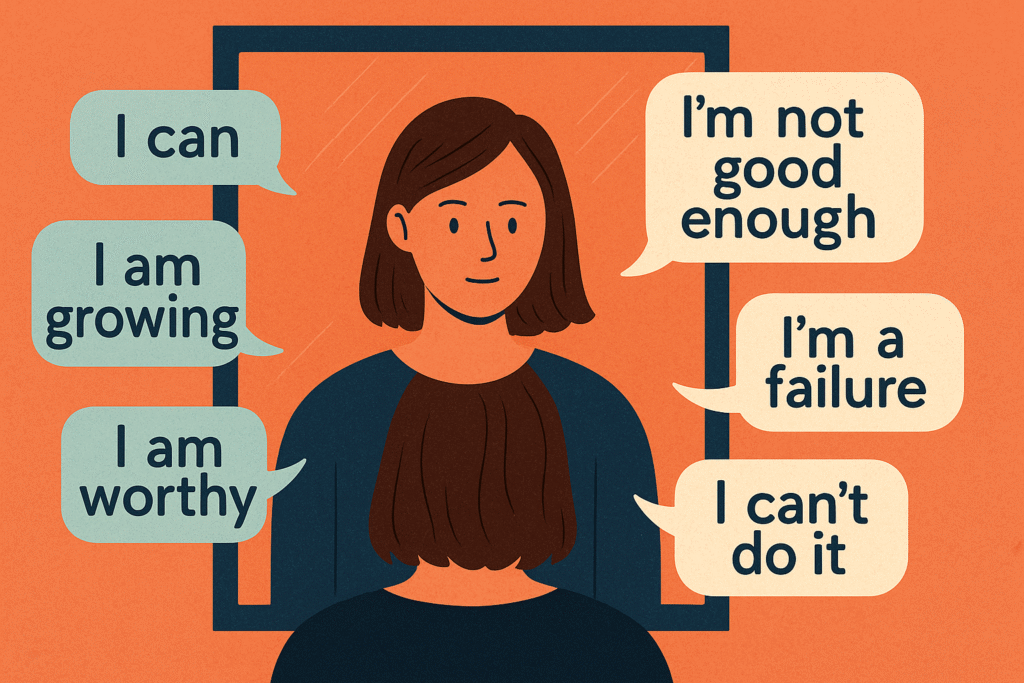Why Your Inner Voice is the Most Powerful Conversation You’ll Ever Have

Introduction: You Talk to Yourself More Than Anyone Else
We all have that little voice inside—sometimes encouraging, sometimes critical. What we don’t often realize is that this inner dialogue shapes how we see ourselves and how confidently we show up in the world.
In fact, self-talk isn’t just background noise; it’s one of the key forces behind your confidence, identity, and even success. In this post, we’ll explore how self-talk shapes confidence and identity, and how to use it to your advantage.
1. What Is Self-Talk, Really?
Self-talk is the ongoing stream of thoughts you say to yourself—either consciously or subconsciously. It includes:
- Inner commentary on your actions (“I always mess this up.”)
- Reactions to feedback (“I knew I wasn’t good enough.”)
- Responses to challenges (“I can figure this out.”)
These statements create a mental script that your brain believes and follows.
2. How Self-Talk Builds (or Breaks) Confidence
Self-talk functions like a confidence thermostat.
🔺 Encouraging self-talk boosts your belief in yourself.
🔻 Negative self-talk erodes your self-worth over time.
For example:
🗨 “I’ve failed before, but I’ve learned a lot. I’m ready now.” = growth and self-trust
🗨 “I always screw things up. Why even try?” = fear and avoidance
The brain stores these patterns, and over time, they become the default beliefs you live by.
3. The Brain Believes What You Repeat
According to neuroscience, the brain doesn’t always distinguish between real events and vividly imagined ones. That means if you keep telling yourself you’re unworthy, your brain will believe and reinforce that with neural pathways.
Conversely, when you practice positive affirmations or counter negative thoughts with facts, your brain starts rewiring itself toward confidence and clarity.
Scientific Note: This is part of neuroplasticity—your brain’s ability to reshape itself through repeated thought patterns.
4. Self-Talk Influences Identity Over Time
Your identity isn’t fixed—it’s shaped by your repeated thoughts and self-statements.
Say something enough times, and it becomes who you believe you are:
- “I’m bad with money.”
- “I’m not good at public speaking.”
- “I’m just not creative.”
Even if these were once true, repeating them cements them into your identity, blocking growth.
On the flip side:
- “I’m learning to manage money better.”
- “I’m building confidence in public speaking.”
- “I’m exploring my creativity.”
This kind of adaptive self-talk opens doors, both mentally and practically.
5. How to Transform Your Self-Talk for Confidence and Growth
✅ Notice the tone: Is it critical, supportive, anxious, empowering?
✅ Challenge the inner critic: Ask, “Would I say this to a friend?”
✅ Reframe negatives: “I can’t” → “I’m learning to…”
✅ Use future-leaning optimism: “I’m not there yet, but I’m making progress.”
✅ Practice regularly: Just like physical training, mental fitness takes reps.
Tip: Journaling or saying affirmations out loud daily can reinforce a growth-oriented identity.
Real-Life Example: Two People, Two Outcomes
Alex tells herself daily, “I always choke under pressure.”
At work, she hesitates, second-guesses, and withdraws from opportunities.
The result? Lower confidence and missed growth.
Jordan says, “Pressure challenges me to grow.”
He still feels nervous—but acts anyway.
Over time, the repetition strengthens his identity as someone who can perform under stress.
Same situation. Different self-talk. Different identity.
Conclusion: You Become What You Repeatedly Tell Yourself
Your internal narrative is the foundation of how you see yourself and what you believe you’re capable of. If you want to boost your confidence and shape a more empowered identity, start by changing the way you speak to yourself.
Because you are listening—and so is your future.
